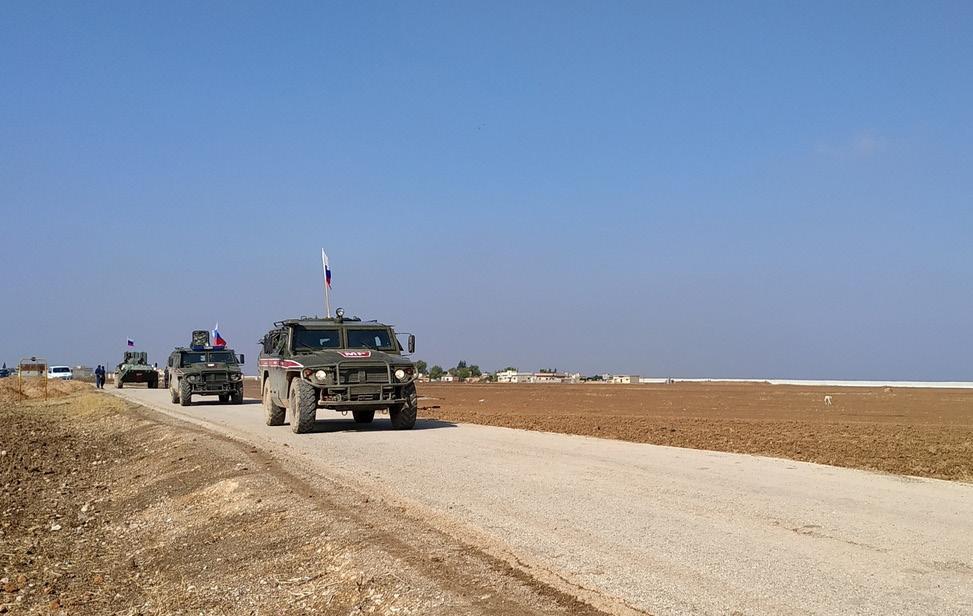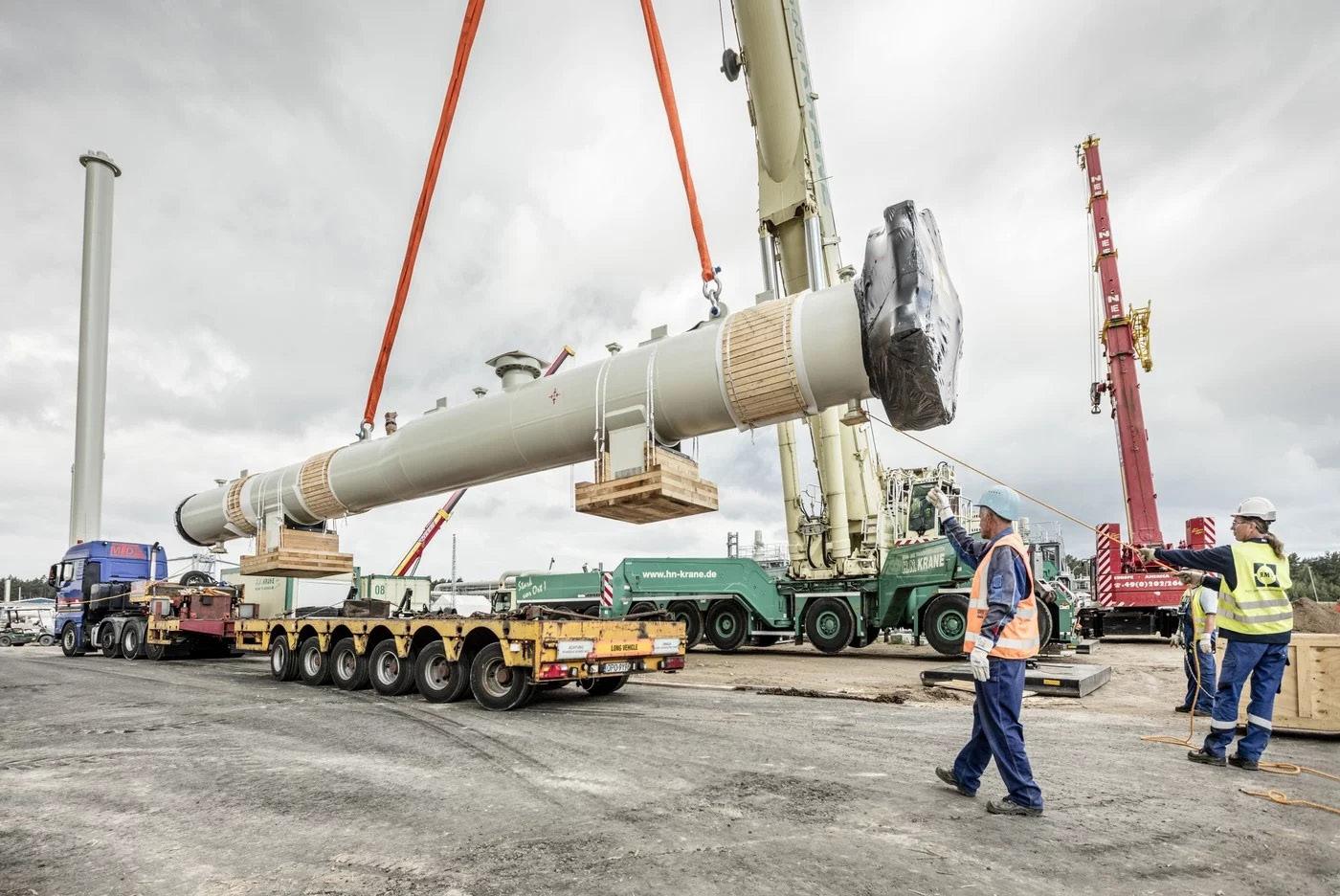
5 minute read
RUSSIA’S DEATH TOLL IN SYRIA RISES AFTER FOUR FSB OFFICERS WERE KILLED
The rate for pumping oil via the Unecha (Vysokoye) – Brody route is 156.93 roubles. Indexed were also oil transit tariffs via the Gomeltransneft Druzhba network, as calculated in Belarusian roubles. The fares for oil transportation via Rechitsa – Mozyr oil refinery will now total 0.61 Belarusian roubles per 1 tonne (without VAT), via Rechitsa – Adamov – 9.00/1t, via Rechitsa – Mozyr line operations dispatcher station – 0.52, while amounting to 1.28 via Rechitsa – Brody. Belarusian authorities said the tariffs for oil transportation through the Gomeltransneft Druzhba networks, calculated in Russian roubles would be as follows: 43.02 per 1 tonne (without VAT) via Nevel –Polotsk – Novopolotsk refinery; 165.16 – via Unecha (Vysokoye) – Polotsk – Novopolotsk refinery; 77.86 – via Unecha (Vysokoye) – Mozyr – Mozyr oil refinery.
RUSSIA’S DEATH TOLL IN SYRIA RISES AFTER FOUR FSB OFFICERS WERE KILLED 4 February 2020
Advertisement
Four FSB special forces officers reportedly died on February 1 while performing special tasks in Syria, after having fallen into the hands of militants. This is yet another bad news the Kremlin had to face recently. Syrian government forces opened fire on the Turkish military’s positions. Turkey answered with an assault of its own, killing between a dozen and several dozen soldiers in a retaliatory strike on Syrian positions. Ankara has lambasted Moscow over its noncompliance with obligations in Idlib province while threatening to launch a fresh military assault against government forces. Not only might the incident further escalate the war in Idlib and bring Turkish-Russian cooperation to a halt, but this could also provoke a spat between Moscow and Ankara, as these two have maintained friendly ties over the past few years.
Reports on the death of four officers of the FSB’s Special Operations Center came on Sunday, February 2. Last Saturday, February 1, 2020, the four officers were killed after their vehicle had been hit by mortar fire near the Syrian city of Aleppo. Another version says that the vehicle carrying the Russian servicemen purportedly rode over a landmine. Syrian government forces are waging a military offensive against insurgent fighters west of Aleppo, most of whom have the support of Turkey. The victims were identified as Major Bulat Akhmatyanov, Lieutenant Vsevolod Trofimov, both of the Directorate S of the FSB’s Special Operations Center, as well as Major Ruslan Gimadiyev and Capital Dmitry Minov, the last of whom worked in the K division of the Federal Security Service. All four officers fought in Syria in the FSB’s special unit tasked with “fighting terror groups.” Assisted by Russian air forces, Spetsnaz special units managed to take the bodies back to Russia. Unofficial reports say the assailants hailed from pro-Turkish rebel units that operated in the area.
The four officers’ death by pro-Turkish militants may exacerbate the ongoing crisis in Turkey’s relations with Russia. Erdogan has accused Russia of failing to keep his word to end meddling in Libya, saying Ankara was sending mercenaries to help Marshall Khalifa Haftar. Tensions ran high on Erdogan’s February 3 visit to Kyiv when the Turkish leader reiterated Ankara’s lack of recognition for Russia’s “illegitimate takeover” of Crimea. Strains between these two have been on the rise as Erdogan felt infuriated by Moscow’s unwillingness to halt al-Assad’s offensive in Idlib province, and its support for government forces. Damascus, for its part, had only added fuel to the fire when a few Turkish soldiers were killed by Syrian troops on February 2. Turkey waged bloody retaliation against forces loyal to President Bashar al-Assad, while Turkish President Recep Tayyip Erdogan threatened to unleash
SOURCE: SYRIA.MIL.RU
a military campaign in Idlib region. Once provoked, an overt conflict between Turkey and Syria would push Russia in a somewhat uncomfortable position. Moscow cannot afford to see worsening ties with its ally, Bashar al-Assad, because this is precisely what Iran seeks while in the pursuit of a decisive voice in Damascus. On the other hand, the Kremlin’s cooperation with Ankara, which has flourished over the past few years, faces the risk of collapsing. Russia traded its S-400 systems to Turkey, a move that cast shadow over Ankara’s relations with other NATO allies, while earlier this year, the TurkStream energy project, a gas pipeline running from Russia to Turkey, was launched. Also, these two have long been committed in mutual undertakings in Syria, chiefly under the Astana format and the Sochi ceasefire accords.
4 February 2020

SOURCE: NORD-STREAM2.COM
WILL NORD STREAM 2 BE BUILT AT ALL?
A German newspaper reported that the United States seeks to introduce further restrictions against the gas pipeline from Russia to Germany. While those in force since December 2019 have frozen the construction of Nord Stream 2, additional punitive measures might make the investment completely pointless. Much may hinge on both policy and U.S.-Russian current ties. Recent weeks have seen Washington’s delivering blows to Russian grip on many regions of the world. Tensions also have been on the rise in Syria, while Washington has ostentatiously provided support to Belarus. For their part, Bulgarian authorities, who are under pressure from the United States, have waged a campaign against Moscow’s spying, with the Bulgarian stretch of the TurkStream energy pipeline being potentially at risk. T he United States intends to impose fresh sanctions on the Nord Stream 2 gas pipeline if Russia attempts to complete its construction, German business newspaper Handelsblatt reported. The punitive measures may be designed to target European investors and businesses looking to receive Russian-sourced gas provided that the gas pipeline is built at all. Adopted by the U.S. Congress, the sanctions could come as soon as February or March. Perhaps the German government will further engage in their lobbying activities in an attempt to suspend the existing penalties, taking advantage of a loophole in the form of a provision in the act, and block any new ones. Another option Berlin has on the table is to make the European Union










